I’m a big fan of sustainability and respecting the locals when travelling. And I really hope that my readers are too! But sometimes you don’t realise what could be a problem locally and why. That’s why I’ve collected the biggest issues here and hope this helps you to be a better traveller.
If you can think of any other issues, please let me know and I’ll be happy to add to the article!
Riding a quad bike in the dunes
In the 4.5 years that I have been living here in Merzouga, the number of quad bike providers has risen from 2 to around 40. As a result, there are now quad bikes everywhere and at all times in the dunes. There is no longer any silence at all, you can see the tracks everywhere and you have to expect to be knocked over at any moment.
Especially at sunset, when many tourists sit on the dunes and enjoy the views, dozens of quad bikes appear and ruin the atmosphere.
What’s more, the quad bikes completely destroy the ecosystem. They scare off the animals, destroy the few plants and we don’t even have to talk about the CO2 emissions.
Unfortunately, there seems to be good money to be made from them, so new rentals are opening all the time. And politicians seem to have no interest in regulations.
Camel riding in Essaouira
Whilst I have nothing against camel riding in general (I even own one myself), camel riding in Essaouira (and other beach locations) is a different matter. There, the camels stand and lie on the beach all day and soak up the salt water. This is particularly bad for the sensitive soles of their feet. But the climate by the sea is also bad for the rest of their skin (which is difficult to see under their fur). They get pressure sores from the saddle more quickly, which then heal badly.
So, if you come to Essaouira and the desert, please include camel riding in your desert trip. And if not, you can also ride camels in the Palmeraie of Marrakech, for example.

Going on a 3-day tour from Marrakech to the desert for €80
I’ve lived here for quite a long time now and have my own tourism business, so I know all the prices. And I can tell you that only the organiser makes money from such a tour, but none of the service providers involved.
That’s why these tours also stop at various shops, where you are then urged to buy something. This way the driver and guide get a commission. You are not a particularly welcome guest at the hotel and camp because the prices are pushed to the maximum and you won’t book any extras.
The drivers often speed without regard for other road users as they have to keep to fixed times (but want to make several sales stops at the same time).
It is financially impossible to offer such a price if the drivers involved are paid fairly. Please do not support this unethical business model, but look for a tour at a fair price, or perhaps even a private tour. More info on how to book the best desert tour here.
Tipping too much
This is mainly a problem for US tourists. They are used to paying a 25% tip on everything. They tend to ignore the fact that this is completely inappropriate in the rest of the world. However, tipping high amounts leads to various things:
- Expectations that all tourists are willing and able to tip so much
- In Marrakech, it is now difficult for locals to get a taxi because they don’t want to be ripped off and don’t pay tips
- Average prices for services are getting higher if a lot of tips are paid until the locals can no longer afford these things
I think with an average “salary” of 100-150 DH a day in tourism, for example, tipping more than 50% of that is actually too high. However, many people find €5-7 a day too little. But that’s always relative. The cost of living here is so low that this is definitely a good and appropriate tip. People shouldn’t have to rely on tips to survive (which is a huge problem in the catering industry in the US). But if they can, there’s no pressure to change that (see USA again).
Pushing prices too low
An important and fun part of the shopping experience in Morocco is bargaining, it’s simply part of it. Whether you want to buy a carpet or 3 ceramic bowls, the price should always be negotiated.
You can find out more about souvenirs and reasonable prices here.
But you should know where to stop. For things that only cost €5 anyway, you shouldn’t end up arguing over 20 cents and for a carpet that you’ve already negotiated down from €600 to €350, €10 more or less don’t matter.
At the end of the day, the shopkeepers also have to make a living and should earn a fair price. You should always keep that in mind.

Buying small bottles of water
If you’ve ever travelled outside the big cities in Morocco, then you know what happens to all the plastic waste; it ends up on the roadside and in the fields. It’s a really sad picture and I ask every one of you not to contribute to it.
The best thing to do is to use a reusable filter bottle and simply drink the tap water. If you don’t like that, you should at least always buy large bottles, preferably 5 litres, and fill up a reusable bottle with it. This can significantly reduce your plastic waste.
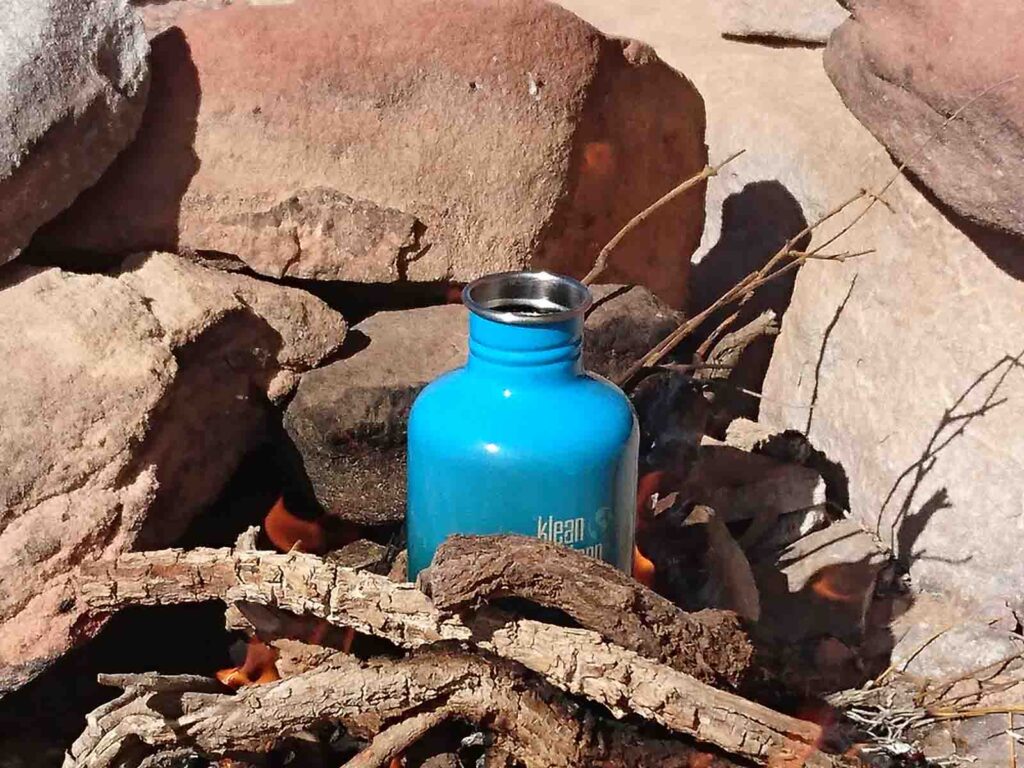
Photographing snakes and monkeys on the Jma el Fna
Even if many tourists find the “snake charmers” super exotic, it is simply animal cruelty. The monkeys, which are often kept on a leash or in a cage, should not be a tourist attraction either. So please don’t take any photos, and certainly don’t pay any money for them.
These animals belong in the wild, and you can still find enough monkeys in the forests of Morocco. In the cedar forest near Ifrane in the Middle Atlas, at the Ouzoud waterfalls and occasionally in the Ourika Valley, they run around and try to steal snacks from your hand.
Photographing desert foxes near Merzouga
In the past, you could still find desert foxes in the dunes (see also the topic of quad bikes), but today this has become an absolute rarity. Unfortunately, the children, especially in Tanamoust just south of Merzouga, like to catch the baby foxes and then stand around by the road with them in their arms. Always in the hope that some tourist will want to photograph the cute animals and give them money in return.
And when the babies grow up and are no longer so cute (and start biting), they are either killed or abandoned. As they have never learnt to hunt on their own, they cannot survive.
The only way to end this suffering is to make it absolutely unattractive for the children. So don’t pay them any money at all, but rather scold them and give them a nasty look.

Taking photos of women and children and post them online
Unfortunately, you see this again and again, often with “influencers” and it is simply completely unethical behaviour. Women in Morocco generally don’t like to be photographed, especially in rural areas. And they certainly don’t want to have their photos published on the internet.
If you still absolutely want to photograph the women, you should explicitly ask for permission. And really respect a no.
You shouldn’t just take photos of children either, even if they want you to. They don’t understand that the photos may end up on the internet and cause problems later on.
What can you do? If the children would like to see photos of themselves, take a photo, show it and simply delete it the next day. If you want to share them in your WhatsApp status or on Instagram, make their faces unrecognisable, put stickers over them or something.
Some women get into trouble when their husbands find pictures of them online (more and more possible with facial recognition). So please don’t just post pictures of the people here online.
Giving children money or sweets
People often ask online what they should bring from home for children here in Morocco. Sweets or toys are usually mentioned. Or even money.
I’m not a fan of any of these things. Money and sweets encourage begging and lead to children not going to school because begging is more lucrative. Apart from the fact that sweets are unhealthy, it should be up to the parents to decide whether to allow them.
Toys are usually made of plastic, break within hours or days and then lie around in the ditch. If toys are your choice, then please bring things like footballs or toys made of wood.
The best thing is to bring clothes for children. Shoes, winter jackets, jeans, T-shirts, everything can be put to good use here. You can simply ask at the hotel where it is best to drop them off, there is usually someone who will take care of it. Here in Merzouga, I also do this occasionally.
Taking photos of the goats in the trees on the road from Marrakech to Essaouira
Another controversial topic. You’ve probably already seen them, the photos of the goats in the argan trees.
It’s actually natural behaviour for goats to climb into the trees, I’ve seen it with my own eyes. However, the goats in the trees on the road between Marrakech and Essaouira are tied up on small platforms and can’t move for hours.
And this is only to guarantee that the goats are in the trees when the tourists arrive. So, it’s worse than looking at animals in the zoo, where at least they can walk around.
Anyone who stops for a photo like this and/or pays money is complicit in the suffering of the animals!
However, if you like, you can drive around on smaller roads between Essaouira and Agadir and, with a bit of luck, see the natural behaviour.
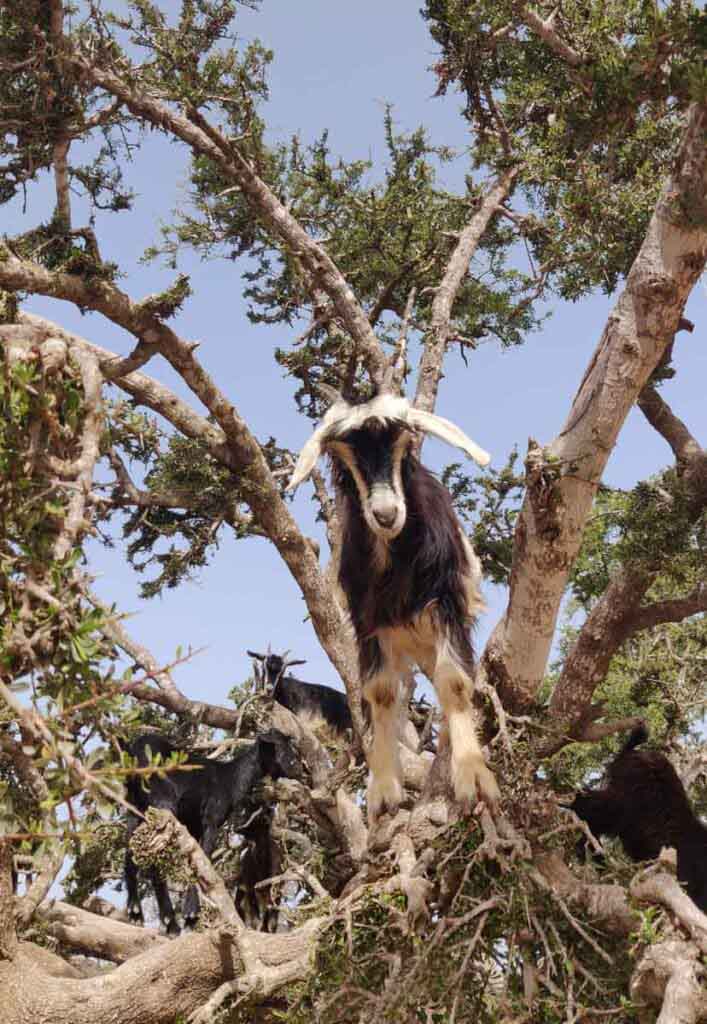
Booking international hotel chains
Compared to the other points on this list, this is a rather minor issue. But I still think it’s important. Tourism should bring money into the country. And that only works if you book with locals. Hotels, tours, food.
If you sleep in a Hilton, you are supporting an American company. If you book a small riad in Marrakech, you are often supporting a Moroccan family (not always, many riads have been restored by foreign investors and the money is now going there).

Wearing miniskirts and spaghetti tops
A question that often comes up in Facebook groups is whether there is a dress code for women in Morocco. This question is not so easy to answer. Officially there is no dress code, everyone can wear what they want. And many men in these groups emphasise that women can also wear miniskirts and spaghetti tops. I think they have clear ulterior motives.
But the majority of the population is very conservative. And for these people, too much skin is disrespectful. And not just for women. I sometimes shake my head when I see European men getting out of their caravan topless. It’s just not done here (and I personally don’t want to have to see it anywhere else either).
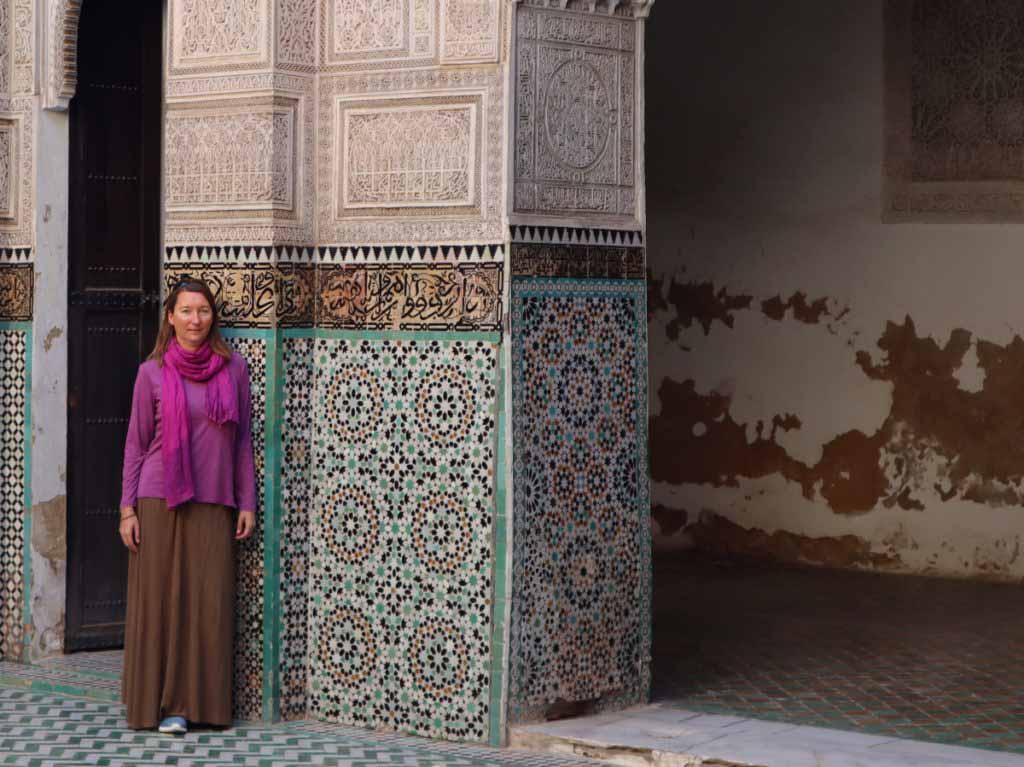
It should be at least knee-length shorts and a T-shirt for both men and women. I always wear long trousers or skirts. And, depending on the temperature, short or long sleeves.
You don’t need to cover your hair and you can also wear open shoes.
Dressing appropriately also increases the likelihood of authentic encounters. Guides who invite you home for tea or couscous. Nice conversations on the bus or in a taxi. And less staring and lewd comments.
Throwing your rubbish in the countryside just because that’s what the locals do
I was recently travelling in a rental car in the north of Morocco, where tourists don’t really go. And everything was full of rubbish! Plastic bags, plastic bottles, dirt wherever you looked.
But that shouldn’t mean that you simply drop your rubbish just because there’s already some lying around.
Always set an example by throwing everything in the bin and complaining to the locals about the rubbish everywhere. Then they might realise how bad it is at some point.
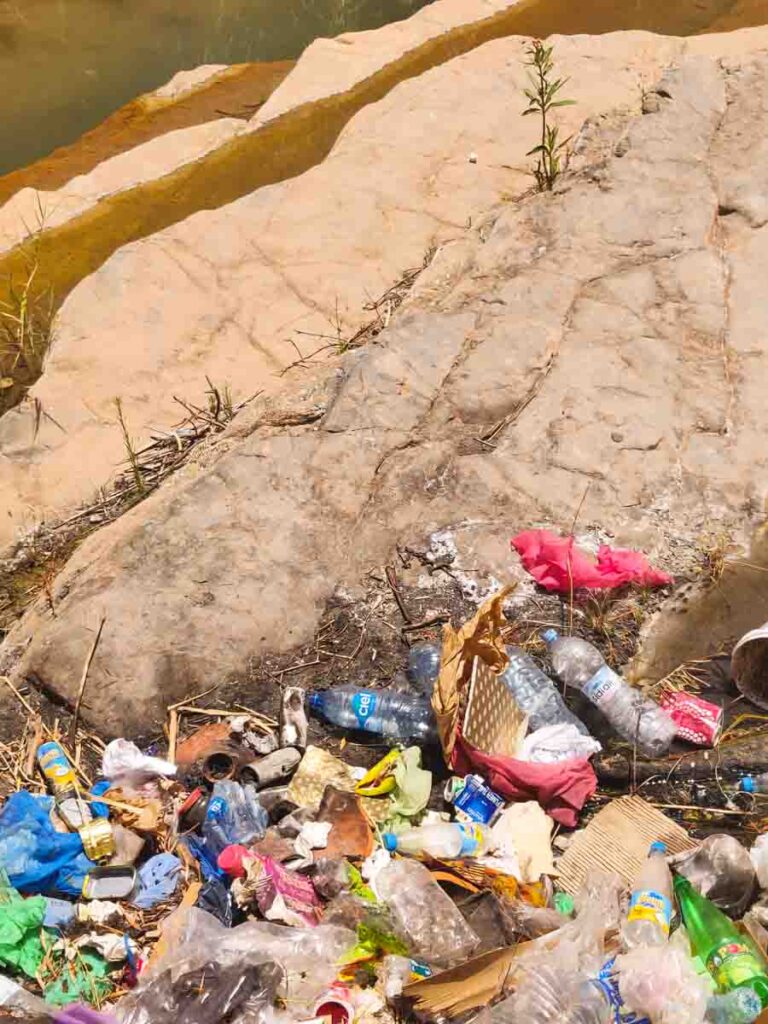
Can you think of anything else? Let me know, I’m happy to include it here!
Is my blog helping you?
Maybe you want to thank me by inviting me for a coffee!
Please note that some of the links above are affiliate links and, at no additional cost to you, I earn a small commission if you make a purchase. That income goes to supporting this website and keeping it free for you and everyone else!
You prefer to let others do the planning? I offer itinerary planning for your trip to Morocco! You can check out the details here.

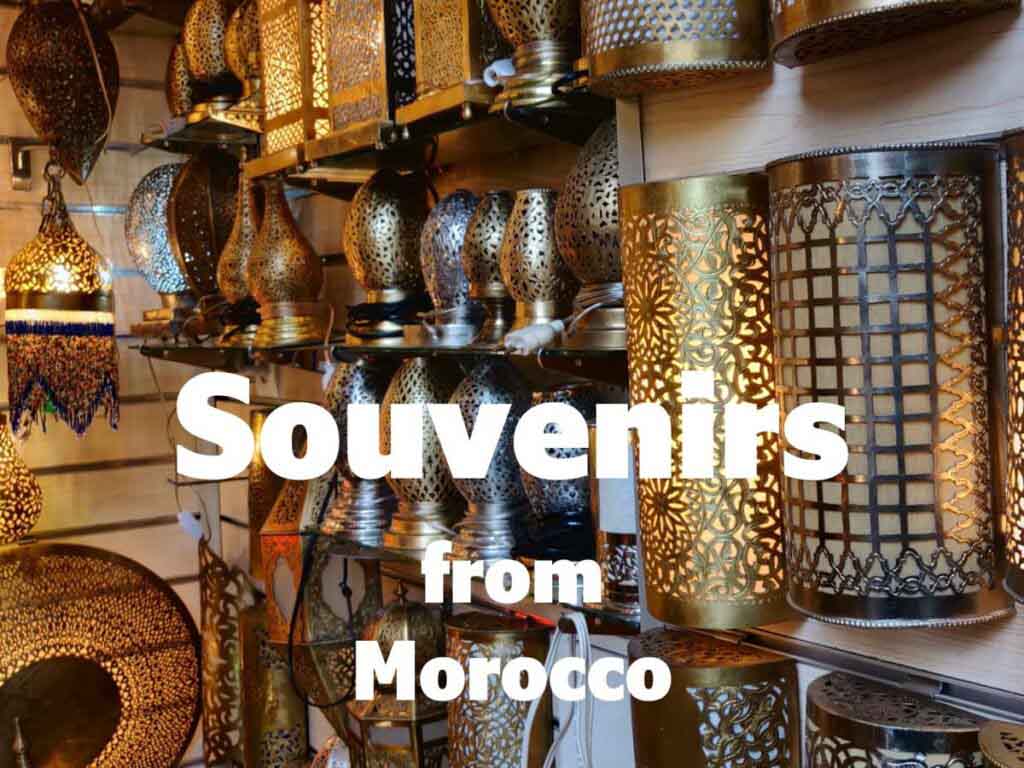



5 Comments
We recently toured Morocco with a Car/driver and I referred often to your 14 unethical things to do in Morocco. Thanks so much – we found they helped us identify annoyances and deal with them better – especially those quad bikes and camel rides, and not giving tips/sweets to kids – a definite no no. Many of your suggestions can be used by any thoughtful traveller around the world. We found the Moroccans to be beautiful, friendly and kind people who treated us very well. We went during Ramadan and Eid which was a very interesting experience.
Thank you!! I am really glad my article helped you with your trip to Morocco. And yes, I agree, most of this applies to everywhere else too.
Nice tips. One question: I’ve read everywhere that in Marrakech children might try to guide you around, exactly as adults do. Would giving a small tip (or candies!) to them be bad? Isn’t that pretty much as giving it to an adult (that is not an official guide)?
Definitely do not give anything to the kids! They will not go to school if they can get money or candy on the streets. It is not as common in Marrakech as it is in Fes though to find kids trying to bring you somewhere. And in my opinion, no one should ever give candy to kids they don’t know. It should be their parents’ decision if they are allowed to eat sweets.
If you want to donate something, get in touch with the Amal center, they have a few programs that you could support.
I truly appreciate your commitment to responsible and ethical travel, shedding light on the potential pitfalls that many travelers might unknowingly contribute to. The issues you’ve highlighted in Morocco, from the environmental impact of quad bikes in the dunes to the ethical concerns of photographing animals and people, offer valuable insights for anyone visiting this beautiful country.